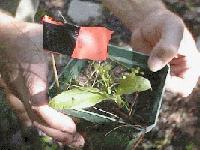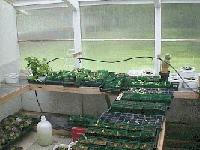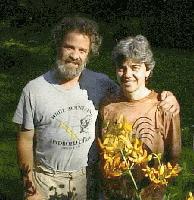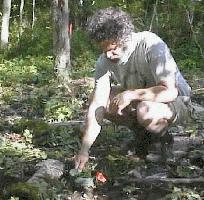 June 28, 1998, Warren, New Hampshire -
Peter Faletra earned his Phd at the University of Massachusetts. He then taught at Universities for a while and turned to high school teaching eight years ago. Somewhere along the line, he forgot that high school students lack the ambition, motivation, desire and courage to succeed.
June 28, 1998, Warren, New Hampshire -
Peter Faletra earned his Phd at the University of Massachusetts. He then taught at Universities for a while and turned to high school teaching eight years ago. Somewhere along the line, he forgot that high school students lack the ambition, motivation, desire and courage to succeed.
The students he chose to teach are at Lin-Wood Public School, a small campus serving children from kindergarten through high school in the towns of Lincoln and Woodstock, New Hampshire. The entire graduating class of thirty-three "Lin-Wood Lumberjack" seniors wouldn't even fill a school bus and you would think the move from a large university to such a small town would require quite an adjustment for the professor - it certainly did for the school.
"The first two years, I got used to the place, and then I asked to move the furniture," Faletra tells me, pulling out his Boston accent for the first time in our conversation, saying "fur-ni-cha" as if to treat the word casually, to punctuate the sentence and to clarify that it wasn't just the furniture he was moving.
Since then, he has been busy. He founded the New Hampshire State Science and Engineering Fair, he founded the Junior Academy of Science in New Hampshire and revived a similar organization in Vermont. He began the Advanced and Applied Science Program at the school, founded the state's Solar Sprint solar-powered miniature car race for middle school students and introduced the high school students to a full-size solar car race.
It is unusual to see a Phd teaching at a high school, especially such a small one. Why does he stay here when he could be earning much more elsewhere? One reason is that he loves the area and the house he and his wife Elaine built in the early eighties. But what keeps him at Lin-Wood school, even through a major "difference of opinion" between him and the principal which almost had him leaving? "I love the kids," he says. "The most rewarding thing is when you see the kids go off to a great place and be so happy with what they're doing."
Several students at Lin-Wood have made remarkable achievements, including gaining admission and scholarships at top institutions, and graduating from them at the top of their class. A small group of students, under his tutelage, has even set the international botanical world on its heels, accomplishing a feat that had stymied professionals for over half a century, and placing the focus of academics around the globe on these two rural towns.

A new generation.
What Doctor Faletra, or "Doc" as the students call him, actually does is connect students in this tourist hamlet, at the west end of the scenic Kancamaugus Highway, to the outside world and he opens the doors of opportunity for any student who chooses to step through. He writes grant applications, he works with corporations and institutions to provide services, and whenever possible, Doc makes his students do the work.
"It's definitely challenging being his student," says Katie Sokolski, a recent graduate. "We worked together to accomplish goals. Now I know what it feels like to work hard, I know what it's like to meet deadlines." Faletra would give Sokolski opportunities such as reviewing grant papers he'd written and appointing her the student director of the lab.
When Doctor Faletra sees potential in a student, he encourages and challenges them. He has found that - more than some people might think - kids are ambitious and motivated. When given opportunity and support you can see their desire drive them, building their courage until they do succeed.
"The worst kids in school are, by and large, good kids," Faletra says. "They're just bored." When he can, he will give one of these kids an opportunity, such as building a greenhouse for orchids, or helping younger students. This works well, as the students are usually eager to achieve at something.
Faletra also gives up more than his time. When a student needed two thousand dollars to build a solar-powered car, Doc suggested he raise the money through sponsors, then he challenged the student, even offering to shave off his trademark beard if the boy could raise the funds. They went to a Rotary meeting with the proposition and the members there loved the idea and quickly came up with the money. On closed circuit televsion, the entire student body watched as their favorite "Doc" parted with the whiskers he'd had since his own high school days.
While teaching college, Dr. Faletra had spent years pushing college students to excell, guiding them through tough curricula, getting grants for research and taking that research to higher levels with each term. Scientific research can be exciting, offering new challenges and discoveries, providing its own energy for achievement. When one gets the great wheels of discovery turning, it is hard to stop them and wben Faletra crossed over to the high school envrions, his wheels were spinning.
In 1994, one of his students, April Dovholuk, wanted to do a research project on tissue cultures - Faletra's specialty. Doc had equipment left over from a company he founded and he donated much of it (about $75,000 worth) to the school. His tenacity and many contacts helped him build a viable tissue culture lab in the high school and, according to Faletra, at no cost to the school.
His field was hemotology, but work on animal tissue cultures is prohibited in public schools. So, in an act of academic swagger, he crossed over to the field of plant tissue cultures.
They chose the Showy Lady Slipper (Cypripedium reginae) and worked for diligently on the project. They were driven by the fact that the flower they had chosen happened to be critically endangered and that their efforts might actually help rescue this valuable species. They weren't daunted by the fact that experts had been trying to achieve the same goal for fifty years.
After thousands of hours of work over two years, Faletra and three students went to the International Science and Engineering Fair - a worldwide competition - with an incredible project; they had successully pulled a culture from this critically endangered species of orchid, and they germinated new ones. In fact, they could germinate the plant in only two months, while it took eighteen months in the wild, and they were on their way to producing thousands of these orchids and revitalizing the species' population in New Hampshire.
The greenhouse where students have raised over ten- thousand orchids to plant in the wild.
Dr. Faletra offered the project of building this structure to some boys who are ensuring its survival. "Somebody asked me 'aren't you afraid of vandals destroying this greenhouse?'" Faletra says. "And Tim, who was on top of the thing, building it, shouted; 'we are the vandals!'"
For Tyler King, April Dovholuk and Katie Sokolski, who had never before left New England, the trip to the fair was a whole new world. Meeting hundreds of the world's top science students awed and inspired them. But when these small-town students competed in this great event and were ultimately chosen as the second best science team in the world, it must have floored them.
The project was so important and the students' determination so great, that Katie Sokolski would return the next year and again take second place.
When the news of the Showy Lady's Slipper hit the scientific world, there was a great stir - and there still is. Botanists are requesting the students' report, orchid growers want the cultures for their own research and people come from around New England to buy root stock and plants for their yards. Faletra put it simply; "these kids are looked upon as the best tissue culturists of orchids in the world."
Florist Georgia Ross-Thompson sells the orchids to the public as a favor to the school. "It's quite thrilling," she says. "We are the only people in the world selling this product. People feel not only amazed that young people discovered this, but they're excited that they can do something for their environment."
It has not all been easy for Doc, as the cogs of his teaching style don't always fit into the public school machine. He doesn't like using textbooks and he rides his students pretty hard at times. "That's one of the things I'll do," he says. "If they screw up, I'll let them know it. A student can tell if he's getting moot praise." Faletra also gains students access to off-campus facilities and projects at universities and corporations, which sometimes takes them away from classes.
The Faletras enjoy their flower garden in the side yard of the home they built in Warren, New Hampshire.
One of his students was invited to be the keynote speaker at a major event at the Marie Selby Botanical Gardens, in Florida - a very impressive feat - to relate her experiences with the Showy Lady's Slipper. The student had missed too many classes already and, according to Dr. Faletra; "the principal asked me, 'can't someone else go in her place?'"
After staying late at school and working with students on projects on weekends and summers, helping with projects like ADAPT and even judging a local fiddler contest, it's a wonder the professor has any time to spend in his recording studio, writing music and playing the guitar and banjo, or to design and build homes for people. Not having children gives him and Elaine more time to do these things, so some day, he promises, he'll even get that 1959 Triumph motorcycle restored.
Students of Dr. Faletra are indeed going to great places. Through their own volition and his and other teachers' guidance, they have received grants and cash awards totalling fifty-thousand dollars.
One of his first students, Lisa McTeagh, graduated from Harvard University with honors, Erin LaBrecque graduated in the top one percent at the University of Maryland, April Dovholuk is attending Cornell University on a three-quarter scholarship and Katie Sokolski, who until a few years ago did not even have a telephone in her rural home, received a full scholarship at Wellesley College, worth some $120,000.
There is no telling the true success of Doc's guidance, of the inspiration it serves to other students and of the surge in morale and interest in the sciences in this school and community.
Dr. Peter Faletra knows that he is not solely responsible for these students' success - he gives the students themselves the credit, along with other teachers. But it surely must be rewarding to drive to the school each day, read the news in the papers, get the excited phone calls of students' successes beyond high school and to watch his flowers blossom.
This plant, the critically endangered Showy Lady's Slipper, may again flourish in the rugged New Hampshire mountains and countryside, thanks to the determination of students at Lin-Wood public school in Lincoln, New Hampshire.




